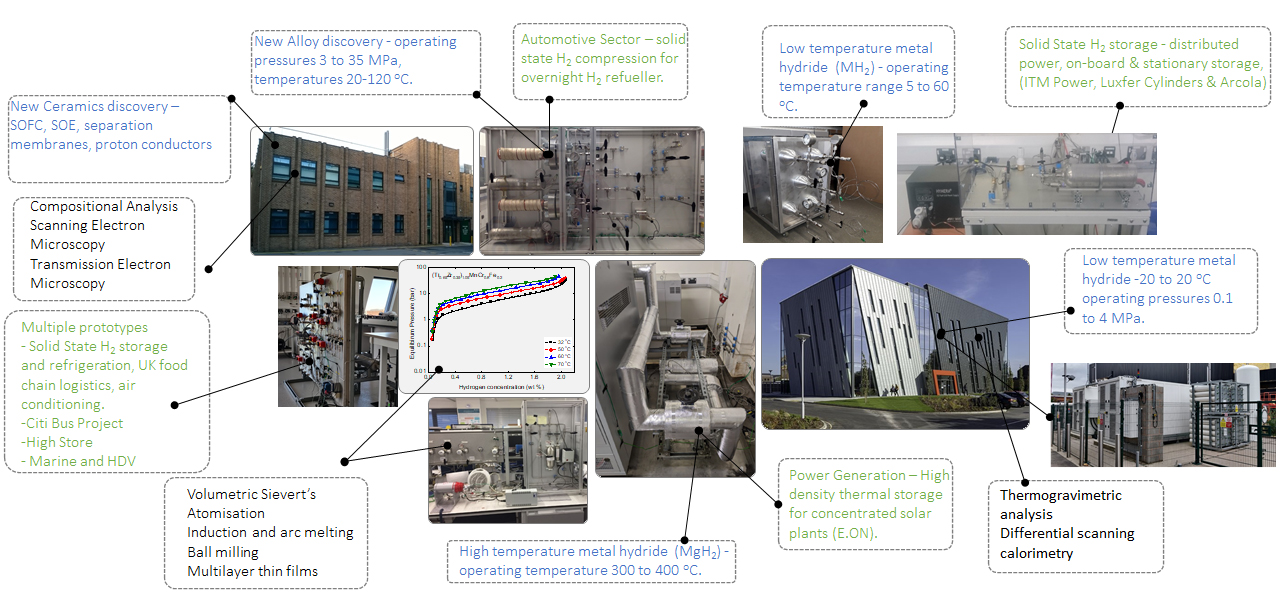As the fuel crisis sees an increased interest in low carbon alternative energy carriers, demand for hydrogen looks set to soar. A key barrier to uptake is the development of practical and cost-effective storage solutions.
At the University of Nottingham, a dedicated hydrogen storage group is exploring ways to solve this problem.
The group is led by Professor David Grant who is the Director of the University of Nottingham Energy Institute.
Research is both fundamental and applied, with key initiatives exploring new materials for use in hydrogen stores, and the development of hydrogen based thermal storage, a method that allows thermal energy to be stored at varying scales for later use.
How it works
The group explores the fundamental and practical aspects of materials that can store hydrogen through a chemical reaction forming a hydride. The advantage of this is that the hydrogen is not in a solid state in the hydride and can be stored at relatively low pressures. A range of new materials are studied, from complex hydrides, high entropy alloys, to cost effective metal hydrides. These can operate at room temperature and elevated temperatures for a range of different applications, from stationary applications through to transport.
Research is wide ranging and complex, and covers areas such as atomistic modelling, machine learning, materials characterisation, and experimental exploration of potential systems. The move to a zero-carbon economy is considered throughout, with sustainability and social acceptance being a key strand of research, alongside potential economic impact.
Many hydrides are attractive as they have energy densities greater than liquid hydrogen in terms of volume. However, the challenge is to reduce mass and cost of the hydride materials and avoid excessive weight from the tank and supporting infrastructure itself so that the total system is competitive. This is particularly challenging for transport applications, therefore, many of the projects also develop practical demonstrators. These address scale up and system issues such as thermal management and the design of internal and external architectures of the storage tanks to maximise the potential.
The group is one of the largest in the UK, with hydrogen demonstrators, and impressive, purpose built hydrogen laboratories, situated in the Research Acceleration and Demonstration building on the Jubilee Campus at the University of Nottingham.
Current projects
Dual-use energy storage
This Engineering and Physical Sciences Research Council (EPSRC) funded project aims to produce a highly efficient, innovative, and cost-effective dual-use hydrogen storage technology that can be used in a range of industrial cooling processes, including delivering hydrogen to a fuel cell and generating direct cooling for refrigeration.
Ocean Refuel
The EPSRC funded Ocean-REFuel programme brings together a multidisciplinary team to establish fundamental scientific and engineering understanding for the conversion of ocean renewable energy such as offshore wind, to liquid and gaseous fuels. Led by the University of Strathclyde, the initiative draws on the expertise of the Universities of Nottingham, Cardiff, Imperial, and Newcastle.
MariNH3
This multi-disciplinary EPSRC programme seeks to decarbonise marine transport through innovation in ammonia thermal propulsion. As part of this, the storage of fuel mixed with hydrogen will be explored. Led by the University of Nottingham, key partners include the Universities of Cardiff, Birmingham, Brighton and the Science and Technology Facilities Council (STFC).
High-Store
This Business, Energy, and Industrial Strategy (BEIS) funded project is exploring high temperature hydrogen stores that can use a cheap metal hydride with an energy density superior to that of compressed gas and liquid hydrogen. The initiative is a collaboration with independent research and technology organisation TWI, and Chesterfield Special Cylinders.
Demonstrator projects
These are many and varied. One example is the CitiBus project, where hydrogen stores feed fuel cells and electric machines. This work is undertaken in partnership with the Power Electronics and Machine Centre at the University of Nottingham and is funded by Local Enterprise Partnership (D2N2), the Energy Research Accelerator, and the Propulsion Futures Beacon.
Other key projects explore stores for marine and off-road vehicles that use hydrogen combustion engines. Research is in partnership with the University’s Low Carbon Internal Combustion Group.
Hydrogen research map

Contact
Enquiries regarding collaboration are welcomed.
Please contact energy@nottingham.ac.uk
Enquiries about specific areas of research can be made through the group leads:
Professor David Grant
Hydrogen Systems: Dr Alastair Stuart; Dr Marcus Adams
Modelling: Dr Sanliang Ling
IC engines: Professor Alasdair Cairns
Fuel Dynamics: Professor Carol Eastwick
Sustainable Process Technologies: Dr Jon McKechnie
SOFC: Dr Ming Li